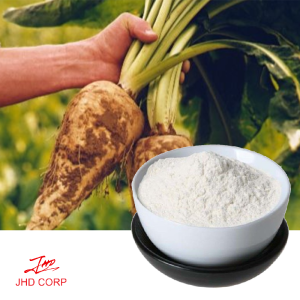What are the limits on the intake of inulin powder?
Inulin is a polysaccharide naturally occurring in plants and a soluble dietary fiber. It is found in large quantities in the roots of Compositae such as chicory and Jerusalem artichoke.
Inulin is a polysaccharide naturally occurring in plants and a soluble dietary fiber. It is found in large quantities in the roots of Compositae such as chicory and Jerusalem artichoke. Inulin is a white powder obtained by spray drying and other steps after removing protein and minerals from these plant roots.
Why take inulin powder?
1. Improve constipation
Because inulin is a dietary fiber, it has a good effect on improving constipation. Studies have shown that without changing the original diet and exercise, taking 12g of inulin supplements per day can soften the stool and increase the frequency of defecation.

2. Substitute sugar for oil
There are more and more "low-fat and low-sugar" foods with inulin added on the market, mainly because it can indeed be used to replace part of the oil and sugar. At the same time, inulin itself has a certain sweetness, and it is also approved to be used as a sweetener in Europe.
3. Improve blood lipids
During the process of intestinal bacteria fermenting inulin, a large amount of short-chain fatty acids will be produced, and these short-chain fatty acids can improve the metabolic status of the human body.
Regarding Inulin Fiber Intake:
For healthy people, 0.14g/kg inulin supplementation is unlikely to cause adverse reactions. Relief of constipation generally requires a larger dose of inulin, generally 0.21-0.25/kg. For sensitive groups or IBS patients, inulin supplementation should be cautious in order to avoid the aggravation of symptoms.















